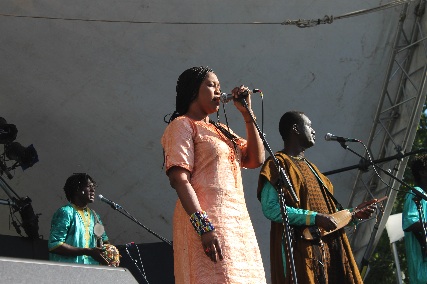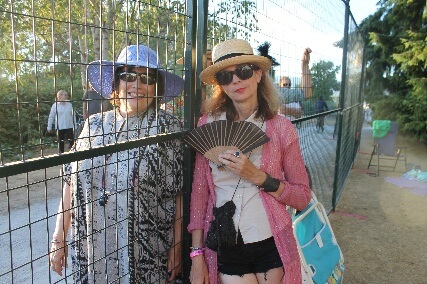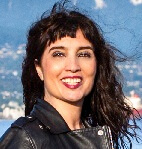A special three-day ritual unfolds every year in my hometown.
It’s called the Vancouver Folk Music Festival or, as it’s lovingly referred to by regulars and locals, Folk Fest.
Now in its 38th year, the festival has grown from an earnest hippie-inspired gathering to a world music lollapalooza.
Every year, Jericho Beach Park is transformed into a utopian folkie Disneyland – a magic kingdom where anything is possible and cultures collide in informal but marvelous ways. Think “It’s a Small World After All”meets Woodstock and you’re halfway there.
But like any worthy cultural happening, Folk Fest is much more than the sum of its parts. At its best, it’s a kind of weltseele gestalt – a Romantic musical adventure that breaks down barriers with a strong dose of tie-dye and patchouli oil.
The next day, the Folk Fest, with its steaming porta-potties, extreme heat and dust, and thousands of exhausted folkfesters, began to resemble more of a refugee camp than a festival, albeit a peaceful one with a beer garden located in one of the most expensive real-estate enclaves in North America.
But in one of the most racially segregated cities in North America, and in a world where 60 million people are displaced by war, conflict or persecution, it provides a needed respite from the harsh realities of the world as it is, and points the way to more peaceful possibilities.
Marking Eid
This year, the festival coincided with Eid al-Fitr– the three-day ritual of feasting and forgiveness that marks the end of 28 days of fasting during the holy month of Ramadan. With my own mixed-faith background and years spent working in the Middle East, I was very aware of the timing and wondered what spending three days of Eid – kind of like a Muslim Christmas celebrated by a billion people around the world – at the Folk Fest would be like.
I arrived on Friday afternoon and met Musqueam storyteller Henry Charles, fresh from a ceremony on the main stage where he welcomed everyone to his ancestral land. I introduced him to my friend Rabbi David Mivasair, who would soon be leading the Shabbat prayer – a Folk Fest tradition for many years – in a circle under a tree, just north of the main stage.
 I confessed to David that I was feeling a bit like an “Eid orphan” and hoped to somehow mark the holiday while being at the festival. We decided that, after the traditional prayers in Hebrew, I would say the al-Fatihah (the Muslim equivalent of the Lord’s Prayer) in the spirit of peace and reconciliation embodied by Eid al-Fitr.
I confessed to David that I was feeling a bit like an “Eid orphan” and hoped to somehow mark the holiday while being at the festival. We decided that, after the traditional prayers in Hebrew, I would say the al-Fatihah (the Muslim equivalent of the Lord’s Prayer) in the spirit of peace and reconciliation embodied by Eid al-Fitr.
As sunset neared, we gathered together and, in spite of a strong wind, David lit the Shabbat candles. After the traditional Hebrew prayers were recited, David explained to everyone that it was the first day of Eid, and introduced me.
I began to chant the al-Fatihah just as a rather loud Irish band started to play, but somehow it all worked; a nice Canadian interfaith Eid/Shabbat. Many people thanked me for saying the prayer and wished there could be more similar opportunities. Afterwards, some of us sat and chatted, eating challah and sipping kosher wine. Later, I took the leftover challah in my pocket and distributed it to friends as I danced to the Melbourne Ska Orchestra.
Friends across cultures
The next day, I received an email out of the blue from a New York–based Palestinian couple who had connected with me online after reading an Al Jazeera article I wrote on Iraqi women. Ahmed, originally from Hebron, was in Vancouver accompanying his wife Nabila (originally from Jaffa – a fact that would make their marriage illegal in Israel today), a professor of public health at Columbia, who was in town for an AIDS conference. They decided to surprise me and show up at the festival.
I noticed that the wire fence surrounding the festival seemed less of a barrier than it had at the beginning. Friends and family were chatting, holding hands and even hoisting patio chairs over its edges.
Over lamb donairs served by smiling blondes, we met and exchanged ancestral stories. When Rabbi David rang, I told him I had some friends he’d like to meet and before long, David and Nabila were chatting about Jaffa like old chums. And as Montreal’s Cécile Doo-Kingué played African-inspired blues, Ahmed invited me to his cousin’s wedding in Hebron.
As we all walked through the crowd of thousands toward the main stage to listen to South Africa’s Bongezwie Mabandla, Israeli guitarist Itamar Erez – who plays with American-Turkish Sufi musician Omar Faruk Tekbilek and who had just returned to Vancouver after a decade – came to greet me with some Israeli friends. I introduced them to Ahmed and Nabila, who were beginning to wonder why I seemed to know so many Israelis. After hailing a cab at the Royal Vancouver Yacht Club, I assured them I was not a Mossad agent.
“Differences can bring us together”
The next day, the Folk Fest, with its steaming porta-potties, extreme heat and dust, and thousands of exhausted folkfesters, began to resemble more of a refugee camp than a festival, albeit a peaceful one with a beer garden located in one of the most expensive real-estate enclaves in North America.
 But as I took in a band from Mali, a psychedelic trio from Venezuela and a group from Nunavut who mixed alt-country with reggae and Inuit throat singing, I noticed that the wire fence surrounding the festival seemed less of a barrier than it had at the beginning. Friends and family were chatting, holding hands and even hoisting patio chairs over its edges.
But as I took in a band from Mali, a psychedelic trio from Venezuela and a group from Nunavut who mixed alt-country with reggae and Inuit throat singing, I noticed that the wire fence surrounding the festival seemed less of a barrier than it had at the beginning. Friends and family were chatting, holding hands and even hoisting patio chairs over its edges.
As I listened to Angelique Kidjo, the formidable closing act and UNICEF ambassador, sing “Malaika,” the Swahili love song made famous by South African anti-apartheid activist and singing star Miriam Makeba, I ran into Cape Town–born Themba Tana. He reminded me that Makeba sang the song of thwarted love when she was married to Black Panther Stokely Carmichael, a union that resulted in the cancellation of her American tours and record deals – and that discrimination against Africans from neighbouring countries was alive and well in his homeland.
Still, we all danced to the diva, and Angelique’s hopeful words about how “our differences can bring us together” rang into the night. And they stayed with me the next day, after the Folk Fest had disappeared like Brigadoon.
Happily, it will return again next July for three very special days. Eid Mubarak, indeed.
Hadani Ditmars is the author of Dancing in the No-Fly Zone: a Woman’s Journey Through Iraq, was a past editor at New Internationalist, and has been reporting from Africa and the Middle East for two decades. Hadani is also a musician who believes that world music can be a powerful vehicle for peace.





